Abstract
Studies to identify the physiological role of glomerular mesangial cells were undertaken using homogeneous cultures of rat glomerular cells of apparent mesangial origin (MS). Cultured MS cells were treated with arginine vasopressin (AVP), angiotensin II (AGII), prostaglandin E2, and parathyroid hormone. AVP (0.1 nM) and AGII (1 nM) stimulated contraction of MS cells in vitro that was complete by 2 min at 37°C or 10 min at 23°C as observed by phase contrast and electron microscopy. Relaxation recurred 15 min after hormonal addition at 23°C. Similar experiments in cloned rat glomerular epithelial cells or “renin”-producing cells did not demonstrate a contractile response. The contraction of MS cells was independent of cyclic AMP (cAMP) and cyclic 3′,5′-guanosine monophosphate (cGMP) production, even when cyclic nucleotides were measured as early as 30 s after hormonal stimulation. To demonstrate that contraction was a function of hormone-receptor interaction, binding of [3H](8-lysine)vasopressin was studied. Specific binding for 1.6 and 5 nM hormone was both time- and dose-dependent. The estimated apparent affinity was 10 nM. In late MS cell passages (>16th) that no longer demonstrated hormone-stimulated contraction, no specific binding of [3H](8-lysine)vasopressin was observed.
Incubations were modified to optimize the conditions for detecting the effect of hormones on cell cyclic nucleotide content. A supramaximal concentration of AVP (200 nM) increased the cAMP content of MS cells twofold in the presence of a phosphodiesterase inhibitor. Similar experiments with prostaglandin E2 (1 μg/ml) led to a 1.5-6-fold increase in MS cell cAMP content, but no effect on contraction was observed. Neither hormone altered cGMP content. These data are further support for the independence of contraction and cyclic nucleotide production.
Our studies suggest that MS cells are the equivalent of smooth muscle cells in the glomerulus and that their contraction may be important in control of glomerular filtration.
Full text
PDF
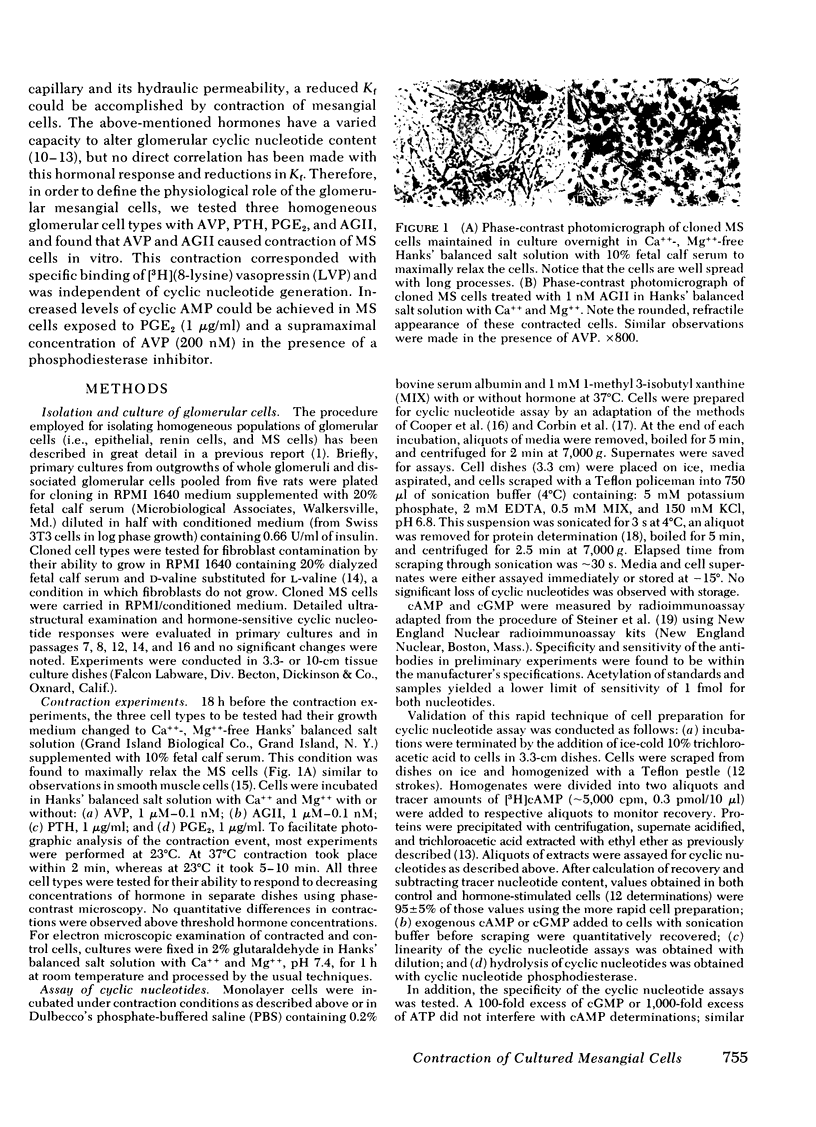
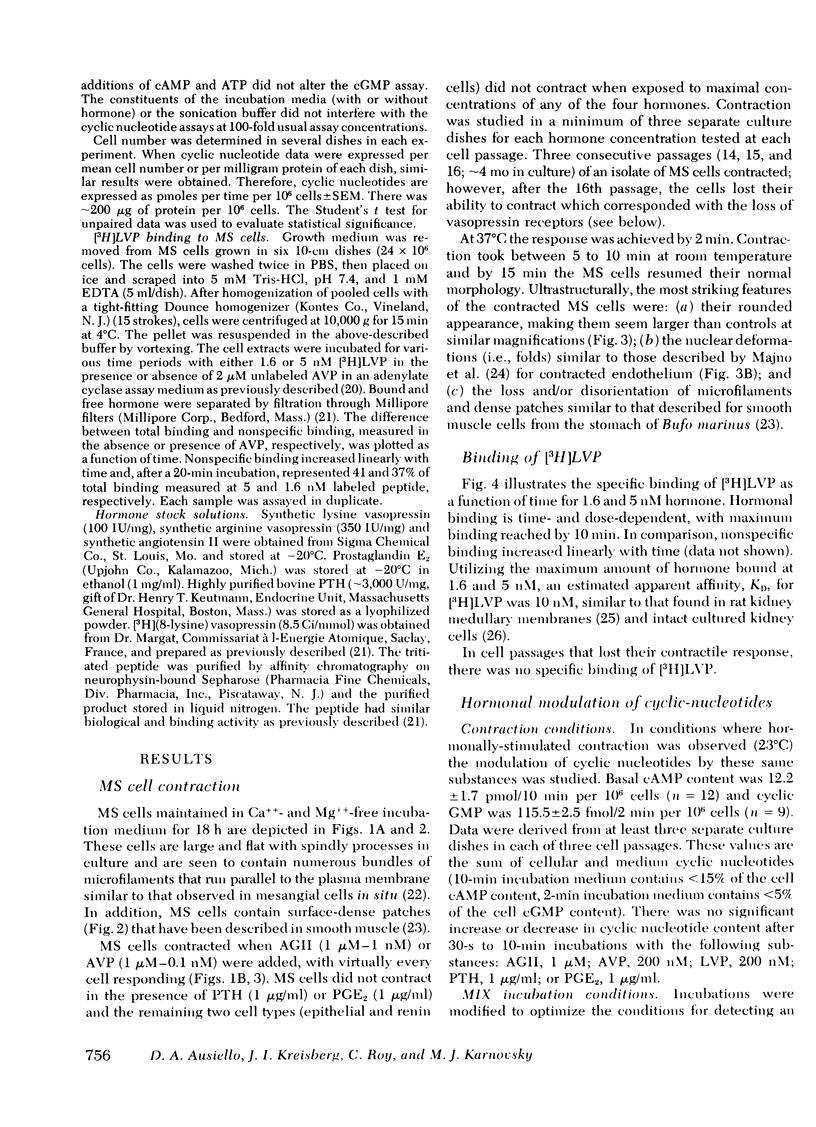
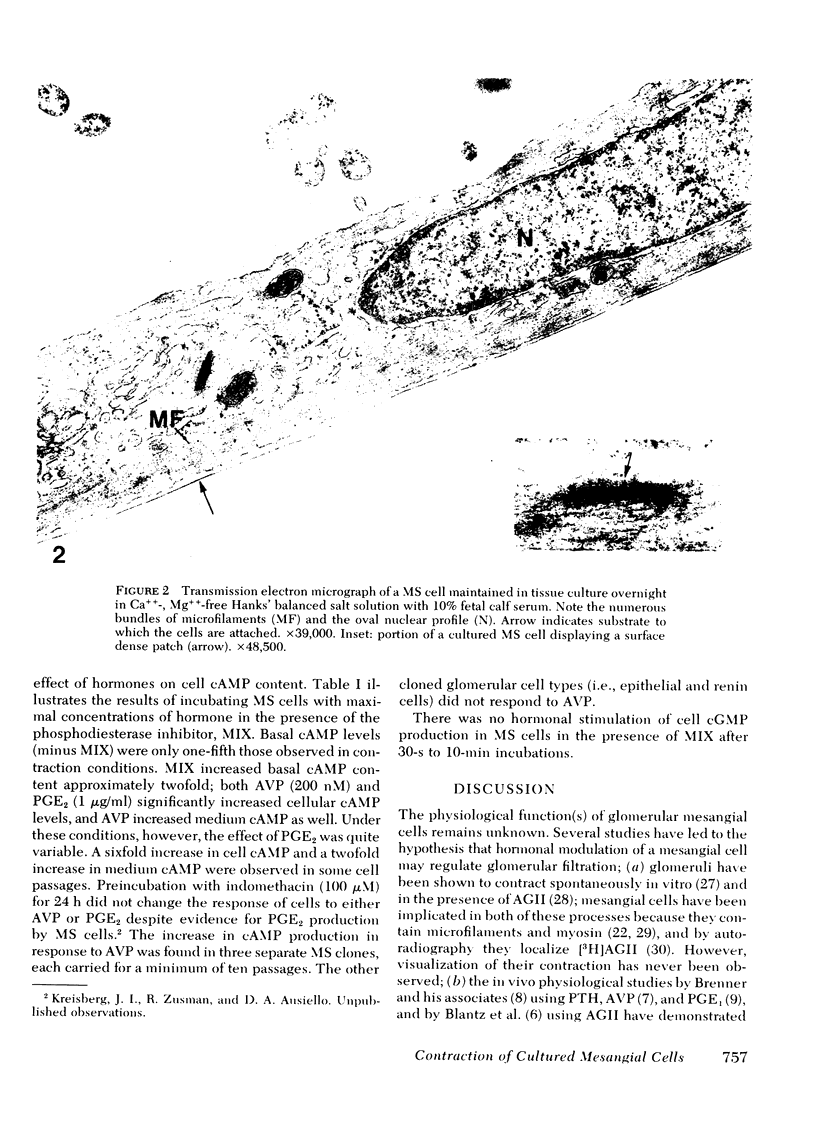

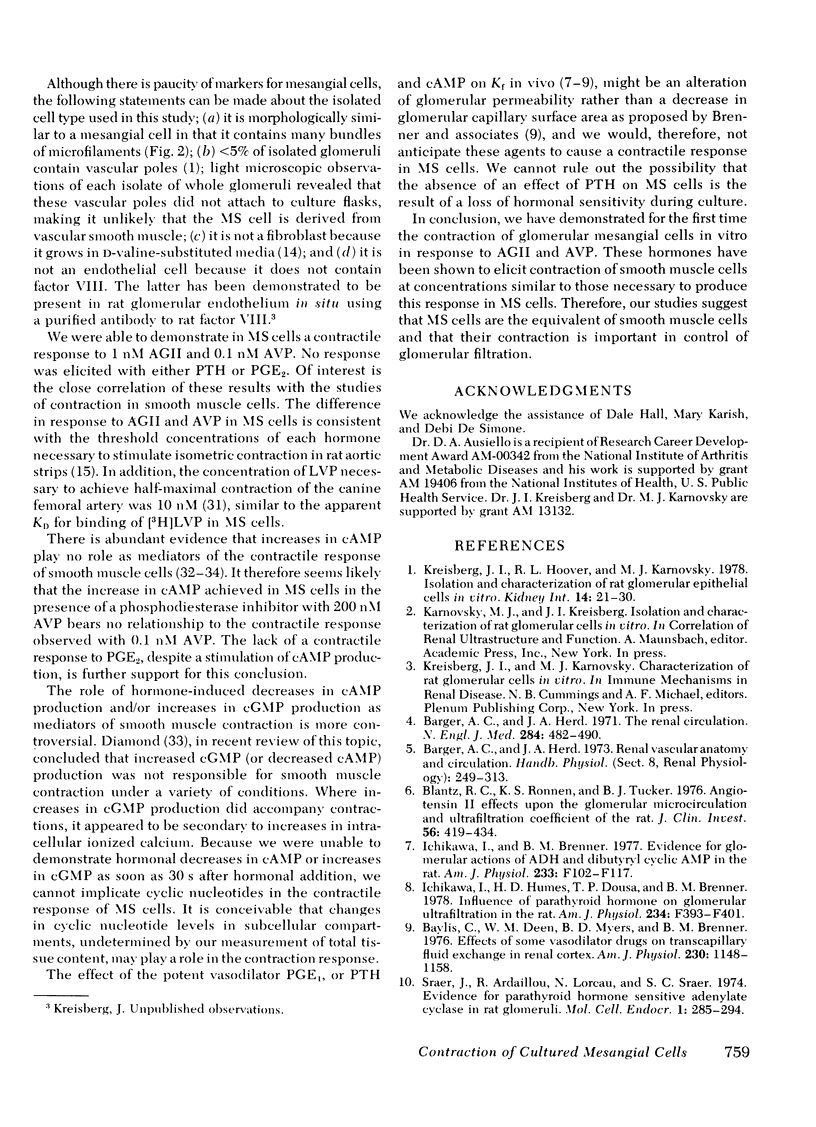
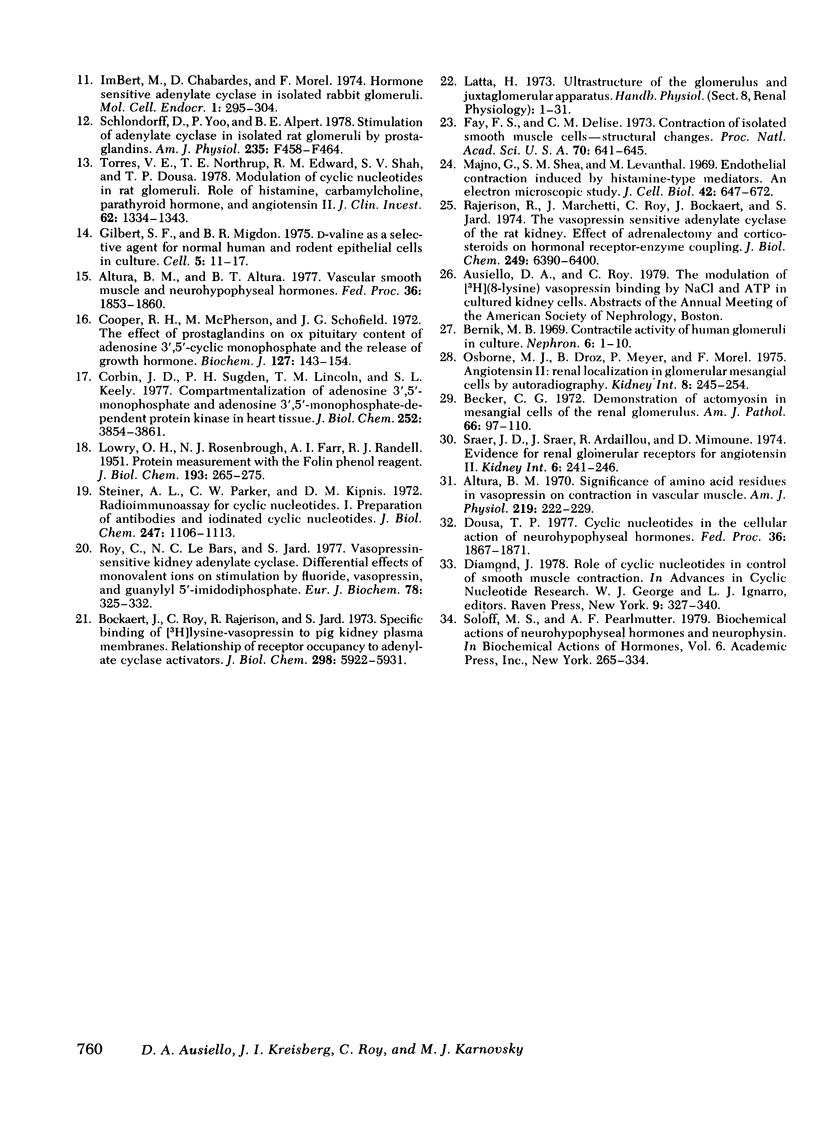
Images in this article
Selected References
These references are in PubMed. This may not be the complete list of references from this article.
- Altura B. M., Altura B. T. Vascular smooth muscle and neurohypophyseal hormones. Fed Proc. 1977 May;36(6):1853–1860. [PubMed] [Google Scholar]
- Altura B. M. Significance of amino acid residues in vasopressin on contraction in vascular muscle. Am J Physiol. 1970 Jul;219(1):222–229. doi: 10.1152/ajplegacy.1970.219.1.222. [DOI] [PubMed] [Google Scholar]
- Barger A. C., Herd J. A. The renal circulation. N Engl J Med. 1971 Mar 4;284(9):482–490. doi: 10.1056/NEJM197103042840907. [DOI] [PubMed] [Google Scholar]
- Baylis C., Deen W. M., Myers B. D., Brenner B. M. Effects of some vasodilator drugs on transcapillary fluid exchange in renal cortex. Am J Physiol. 1976 Apr;230(4):1148–1158. doi: 10.1152/ajplegacy.1976.230.4.1148. [DOI] [PubMed] [Google Scholar]
- Becker C. G. Demonstration of actomyosin in mesangial cells of the renal glomerulus. Am J Pathol. 1972 Jan;66(1):97–110. [PMC free article] [PubMed] [Google Scholar]
- Bernik M. B. Contractile activity of human glomeruli in culture. Nephron. 1969;6(1):1–10. doi: 10.1159/000179708. [DOI] [PubMed] [Google Scholar]
- Blantz R. C., Konnen K. S., Tucker B. J. Angiotensin II effects upon the glomerular microcirculation and ultrafiltration coefficient of the rat. J Clin Invest. 1976 Feb;57(2):419–434. doi: 10.1172/JCI108293. [DOI] [PMC free article] [PubMed] [Google Scholar]
- Bockaert J., Roy C., Rajerison R., Jard S. Specific binding of (3H) lysine-vasopressin to pig kidney plasma membranes. Relationship of receptor occupancy to adenylate cyclase activation. J Biol Chem. 1973 Sep 10;248(17):5922–5931. [PubMed] [Google Scholar]
- Cooper R. H., McPherson M., Schofield J. G. The effect of prostaglandins on ox pituitary content of adenosine 3':5'-cyclic monophosphate and the release of growth hormone. Biochem J. 1972 Mar;127(1):143–154. doi: 10.1042/bj1270143. [DOI] [PMC free article] [PubMed] [Google Scholar]
- Corbin J. D., Sugden P. H., Lincoln T. M., Keely S. L. Compartmentalization of adenosine 3':5'-monophosphate and adenosine 3':5'-monophosphate-dependent protein kinase in heart tissue. J Biol Chem. 1977 Jun 10;252(11):3854–3861. [PubMed] [Google Scholar]
- Dousa T. P. Cyclic nucleotides in the cellular action of neurohypophyseal hormones. Fed Proc. 1977 May;36(6):1867–1871. [PubMed] [Google Scholar]
- Fay F. S., Delise C. M. Contraction of isolated smooth-muscle cells--structural changes. Proc Natl Acad Sci U S A. 1973 Mar;70(3):641–645. doi: 10.1073/pnas.70.3.641. [DOI] [PMC free article] [PubMed] [Google Scholar]
- Gilbert S. F., Migeon B. R. D-valine as a selective agent for normal human and rodent epithelial cells in culture. Cell. 1975 May;5(1):11–17. doi: 10.1016/0092-8674(75)90086-0. [DOI] [PubMed] [Google Scholar]
- Ichikawa I., Brenner B. M. Evidence for glomerular actions of ADH and dibutyryl cyclic AMP in the rat. Am J Physiol. 1977 Aug;233(2):F102–F117. doi: 10.1152/ajprenal.1977.233.2.F102. [DOI] [PubMed] [Google Scholar]
- Ichikawa I., Humes H. D., Dousa T. P., Brenner B. M. Influence of parathyroid hormone on glomerular ultrafiltration in the rat. Am J Physiol. 1978 May;234(5):F393–F401. doi: 10.1152/ajprenal.1978.234.5.F393. [DOI] [PubMed] [Google Scholar]
- LOWRY O. H., ROSEBROUGH N. J., FARR A. L., RANDALL R. J. Protein measurement with the Folin phenol reagent. J Biol Chem. 1951 Nov;193(1):265–275. [PubMed] [Google Scholar]
- Majno G., Shea S. M., Leventhal M. Endothelial contraction induced by histamine-type mediators: an electron microscopic study. J Cell Biol. 1969 Sep;42(3):647–672. doi: 10.1083/jcb.42.3.647. [DOI] [PMC free article] [PubMed] [Google Scholar]
- Osborne M. J., Droz B., Meyer P., Morel F. Angiotensin II: renal localization in glomerular mesangial cells by autoradiography. Kidney Int. 1975 Oct;8(4):245–254. doi: 10.1038/ki.1975.108. [DOI] [PubMed] [Google Scholar]
- Rajerison R., Marchetti J., Roy C., Bockaert J., Jard S. The vasopressin-sensitive adenylate cyclase of the rat kidney. Effect of adrenalectomy and corticosteroids on hormonal receptor-enzyme coupling. J Biol Chem. 1974 Oct 25;249(20):6390–6400. [PubMed] [Google Scholar]
- Roy C., Le Bars N. C., Jard S. Vasopressin-sensitive kidney adenylate cyclase. Differential effects of monovalent ions on stimulation by fluoride, vasopressin and guanylyl 5'-imidodiphosphate. Eur J Biochem. 1977 Sep;78(2):325–332. doi: 10.1111/j.1432-1033.1977.tb11743.x. [DOI] [PubMed] [Google Scholar]
- Schlondorff D., Yoo P., Alpert B. E. Stimulation of adenylate cyclase in isolated rat glomeruli by prostaglandins. Am J Physiol. 1978 Nov;235(5):F458–F464. doi: 10.1152/ajprenal.1978.235.5.F458. [DOI] [PubMed] [Google Scholar]
- Sraer J. D., Sraer J., Ardaillou R., Mimoune O. Evidence for renal glomerular receptors for angiotensin II. Kidney Int. 1974 Oct;6(4):241–246. doi: 10.1038/ki.1974.105. [DOI] [PubMed] [Google Scholar]
- Steiner A. L., Parker C. W., Kipnis D. M. Radioimmunoassay for cyclic nucleotides. I. Preparation of antibodies and iodinated cyclic nucleotides. J Biol Chem. 1972 Feb 25;247(4):1106–1113. [PubMed] [Google Scholar]
- Torres V. E., Northrup T. E., Edwards R. M., Shah S. V., Dousa T. P. Modulation of cyclic nucleotides in islated rat glomeruli: role of histamine, carbamylcholine, parathyroid hormone, and angiotensin-II. J Clin Invest. 1978 Dec;62(6):1334–1343. doi: 10.1172/JCI109254. [DOI] [PMC free article] [PubMed] [Google Scholar]





